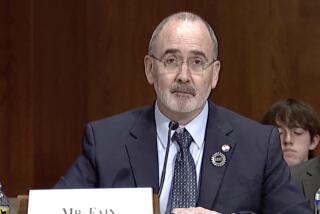32-Hour Average Workweek Predicted : Futurists See Burst of New Uses for Computers at Dawn of Next Century
- Share via
WASHINGTON — The dawn of the 21st Century will find personal computers put to a wide array of new uses, such as voting, filing income tax returns and taking college entrance exams.
Magazines will be available on floppy disks, and racing fans will watch contests on cable TV and place their bets from their couches, automatically debiting or crediting their bank accounts.
Automation, robotics and computer applications in manufacturing will result in a shorter average workweek of 32 hours, meaning more leisure time, while the divorce rate will drop and the marriage rate will increase.
These predictions were among many circulated at the World Future Society’s sixth general assembly, a five-day conference and exposition held last week at the Sheraton Washington Hotel.
Series of Lectures
The conference, titled “Future View, the 1990s & Beyond,” offered a series of lectures, seminars and exhibits geared to research and predictions divided under the headings of biosphere, sociosphere, technosphere, econosphere, politisphere, futuresphere and 21st-Century studies.
The World Future Society, which has 32,000 members including academics, professionals and government employees, has been around for almost a quarter of a century, but it has only recently gained credibility, said Edward Cornish, president of the Bethesda, Md.-based society.
“In the 1960s, people regarded futurists as science fiction fans who took their science fiction books too seriously. But the pace of change in society has been so fast, people need futurists to keep them abreast of what’s happening and help them to identify the range of possibilities for the future,” Cornish said.
Interest in the study of the future also is increasing as the 21st Century nears. “It’s millennial fever,” said Jennifer Jarratt, vice president of J.F. Coates Inc., a Washington-based future analysis firm, and co-author of “What Futurists Believe.”
Jarratt said her firm’s future assessments are based on a comprehensive study of newspapers, journals, databases and other sources of information, as well as an analysis of the past and present.
“Businesses need this as a way to organize their lives and prepare for what lies ahead,” said Jarratt, who added that IBM Corp., AT&T; and numerous government agencies are among her firm’s clients.
Flaws in Education
Joseph F. Coates, president of the firm, said some of the major concerns for business in the future must be addressed today. He cited increasing national illiteracy figures and called for improved classroom education and business training programs.
Sandra Northrop & Associates Inc., a Louisiana business consulting firm, said many people are frightened of the future, but businesses must overcome those fears. She predicted that corporate managers in the year 2000 will have to be great integrators who can combine the old notion of power with new ideas about individual creativity.
“We are still in the evolutionary process, but we are leading to a more healthy system where employees have more self-respect and fulfillment from their work,” Northrop said. According to a report by the society, some other business trends expected for the 21st Century include shifts in the labor force and management.
The number of entrepreneurs will increase as more mid-career professionals get squeezed out of the flattening management pyramid in large companies. In 2001, only one person in 50 will be promoted to top management, compared with one person in 20 in 1987.
By the year 2000, 85% of the labor force will be working for firms that employ fewer than 200 people each.
The service economy is expected to account for as much as 88% of the work force by the year 2000 as low-paying service jobs continue to replace many well-paying jobs lost in manufacturing, transportation and agriculture, the report said.






